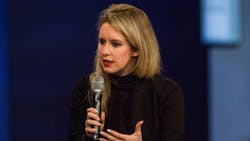Health Care Startup Theranos Hit With Dose of Doubt
Was the story too good to be true?
Elizabeth Holmes dived into science, dropped out of college and, after a decade of stealth mode research and development, grabbed the crown of youngest self-made woman billionaire thanks to the revolutionary blood tests of her Silicon Valley startup, Theranos.
But the 13-year-old private firm now finds itself in the crosshairs of a branch of the Department of Health and Human Services that notified Theranos it was in violation of a set of regulations and that “deficient practices” at one of its labs posed “immediate jeopardy to patient health and safety.”
The Walgreens pharmacy chain that was the health technology startup’s biggest partner this week backed off from using analysis services at the Theranos lab in Newark, California. (Theranos centers hosted by Walgreens are still open in the neighboring state of Arizona, where testing is done at a lab in there.)
The cautionary move weakens the position of Holmes, who has been on the defensive for months after press reports questioning whether the startup has indeed delivered a revolutionary new way to test blood.
Theranos spokeswoman Brooke Buchanan said in a prepared statement that regulators’ concerns stemmed from a survey done last year.
“We are currently reviewing the report, but have already addressed many of the observations during the survey,” Buchanan said, promising a full correction plan within days.
A New Steve Jobs, At Least in Wardrobe
Media outlets knocking Holmes from her pedestal had previously praised the 31-year-old woman as a visionary along the lines of Apple’s famed co-founder Steve Jobs. The comparison was nudged by her tendency to wear black turtlenecks, a wardrobe choice that was a trademark for Jobs.
The early success of Holmes has been credited to a brilliant and tenacious personality. Some media accounts tell of Holmes hounding Stanford University in Silicon Valley until they agreed to let her into Mandarin courses while she was still just a high school student. (Holmes is said to speak the language fluently.)
She was only 19 when she founded Theranos in 2003. Holmes launched the startup in Palo Alto, where Stanford is located, with money her parents had set aside for her education.
Vegetarian, single and childless, she seems solely and completely devoted to her business with scant time spent on her private life. She is said to be driven by personal motivations that include the sudden death of an uncle from a disease that was not diagnosed in time.
“To me, nothing matters more than what people go through when someone they love is found out to be really, really sick,” Holmes said. “That feeling of helplessness is heartbreaking. If I could build something that could change it, that was what I want to do with my life.”
Theranos touts a new way of testing that uses far less blood and delivers faster results much lower cost than traditional methods in U.S. labs.
The Food and Drug Administration gave Theranos the green light last year to use its innovation to test for herpes by putting barely more than a centiliter of blood taken from “a prick of a patient’s finger” into a tiny tube the startup calls a nanotainer.
Shining Star Dims
Holmes and Theranos were a hit with investors, who valued the startup at some $9 billion during the last funding round in 2014. That valuation put Theranos majority shareholder Holmes at the head of a fortune of $3.6 billion, according to Forbes magazine, which described her as the youngest female billionaire whose wealth was not inherited.
Holmes made the Time magazine list of the 100 most influential people in world last year. A portrait photograph of Holmes in the magazine was accompanied by written praise by former secretary of state Henry Kissinger, who is among political figures on the startup’s board. Kissinger lauded Holmes as a “tech visionary” who left Stanford in her sophomore year to devote herself to a vision of making health care “available as a basic human right.”
But recent developments have prompted critics to wonder whether the Theranos story was too good to be true. Late last year, The Wall Street Journal published articles questioning the reliability of Theranos technology and the veracity of the startup’s claims. The newspaper accused Theranos of using widely available commercial equipment — debunking the firm’s claims of “revolutionary” testing.
The company and its boss have publicly defended Theranos and stood by its innovations.
“This is what happens when you work to change things,” Holmes said in an interview on CNBC. “First, they think you’re crazy and they fight you, then all of a sudden, you change the world.”
Skeptics now suggest Theranos is evidence of a bubble when it comes to dizzying valuations of privately held startups.
By Sophie Estienne
Copyright Agence France-Presse, 2016
About the Author
Agence France-Presse
Copyright Agence France-Presse, 2002-2025. AFP text, photos, graphics and logos shall not be reproduced, published, broadcast, rewritten for broadcast or publication or redistributed directly or indirectly in any medium. AFP shall not be held liable for any delays, inaccuracies, errors or omissions in any AFP content, or for any actions taken in consequence.
